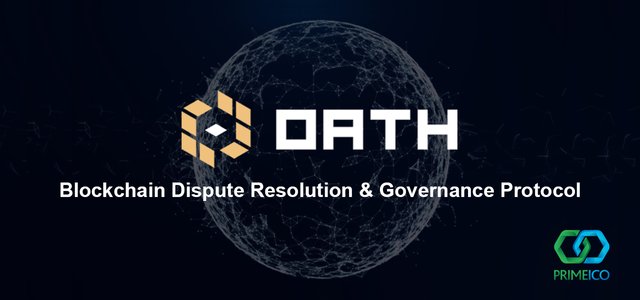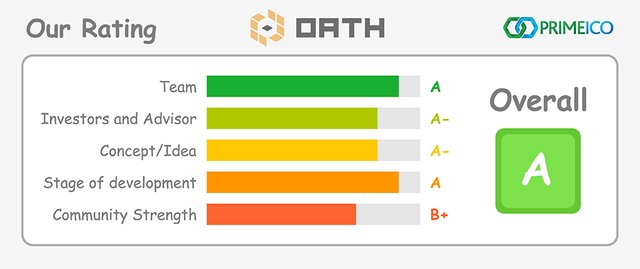OATH Protocol ICO Review - Blockchain Dispute Resolution Governance
1. Overview
What problem does Oath Protocol solve?
Oath Protocol’s vision is that blockchain security should have two layers: cybersecurity and governance. Although the focus tends to be on the technical aspects of security, like anti-hacking and code review, regular users are much more likely to encounter user disputes than security hacks in their day-to-day lives, which means that to them, governance is just as important as IT protection. This is very much in line with what we all experience in our day-to-day lives: we’ve all had to dispute credit card transactions or return something we bought online, but only a few of us have been victims of security hacks.
But how do we deal with user disputes in a decentralized ecosystem that does not (or should not) have centralized arbitration services to resolve those disputes? Oath Protocol is working hard on making it possible. Built on Ethereum and compatible with any public chains or dApps via APIs, Oath Protocol works as a decentralized third party to resolve user disputes, and it relies on juries made up of real blockchain users to do so—much like the jury of peers in the Anglo-American common law system resolves legal disputes in court.
One notable distinction is that Oath Protocol does not aim to replace traditional legal platforms for dispute resolution. Instead, it is more like decentralized customer service, targeting low-value/high-volume disputes that are abundant on peer-to-peer platforms, but are not serious enough to take to court. This is intended to make blockchain users feel more comfortable and secure in the blockchain ecosystem, because they will have recourse should anything go wrong.

Token utility and value
OATH token is intended to provide three utilities:
- it allows participants to access the dispute resolution and governance platform,
- it rewards jurors for making good decisions (voting for the winning party), and
- holding OATH will give jurors the ability to increase their “credit level” and, as a result, be eligible for higher awards.
Parties will need to deposit OATH tokens to facilitate the dispute resolution plan in their smart contract, and the deposit will be used to cover the arbitration fee in case of a dispute. If the contract is successfully executed without any issues, the fee will be returned to the parties. In case of a dispute, the arbitration fee will be awarded to the jurors who correctly voted for the prevailing party. Each juror’s case award is proportional to that juror’s “credit level,” calculated based on several factors: voting history, response time, appeals history, amount of OATH held, and token holding period. The credit level system incentivizes jurors to hold OATH to increase their OATH-based case awards, thereby reducing token velocity.
Oath’s partners (dApps and chains) will need to hold OATH tokens to reward the jurors for resolving disputes on their platforms. There is no minimum fee, and disputants can manage the costs according to the free-market concept—the juror market will dictate the acceptable dispute resolution fee. Jurors will get rewarded when they correctly vote for the winning party in proportion to their credit level. The jurors will be incentivized to hold OATH to increase their credit level, returning only a portion of their awards back to secondary markets for re-purchase by the partners. In this way, the token value is expected to be less volatile with a steadily increasing demand.
How advanced is the project?
Oath Protocol will release a prototype in mid-November, which will kickstart the juror signup process, and they are aiming to have an MVP by the end of this year.
On the website, you can find a detailed white paper, compact one pager, and FAQ section that covers the most commonly asked questions, and a technical design paper.
On their Medium blog, the team provides regular updates on the latest partnerships and achievements as well as the team’s progress. Although the community has been in place for just a few months, there has been a steady growth and interest in the project across the globe, and even independent reviews on YouTube that have helped attract even more attention.
2. Team
Oath Protocol has an impressive international team, located in the US and China.
Yin Xu is the CEO and co-founder of Oath, based in Shanghai. Yin holds a Bachelor of Science in Computer Science from University of Wisconsin. He has led his previous company to acquisition (trip.com, acquired by CTrip in 2017), and has more than 10 years of software engineering experience, primarily in Silicon Valley. He started coding when he was 14.
Jenny Vatrenko is the co-founder and COO, based in NYC. She has a law degree from Georgetown University and has previously worked as a litigator at Boies Schiller Flexner (law firm in NY) and as a prosecutor at Brooklyn DA’s Office.
Hongwei Wang is the third co-founder and Head of Engineering. He has more than 10 years of engineering experience and previously worked as a Senior Engineer at Google’s headquarters in Palo Alto, where he is still based today.
Will Zhang is the fourth co-founder. Will holds a Master in Computer Science. He is a serial entrepreneur and has previously founded a cryptocurrency exchange.
In addition to the founding team, there are several other highly skilled team members working on Oath’s design, quantitative modeling, content management, and business development.
The Advisory Board of Oath includes Jia Tian, a known crypto-investor and chief scientist at Cortex and Bitfund, Huawei Kong, Director of the Institute of Computing Technology in Shanghai, Xiahong Lin, an investor and entrepreneur, David Hong, a lawyer, Dafeng Guo, an entrepreneur, Rui Zhang, a lawyer and entrepreneur, Zainan Zhou, Ethereum core contributor and senior engineer at Google, and Annetta Li, a marketing expert.

3. Product
From a technical point, Oath Protocol provides extension-libraries to existing smart contract programming languages (first version will be in Solidity) and an infrastructure layer for decentralized applications. Developers will be able to integrate Oath Protocol through APIs on their platform as the standard dispute resolution and governance solution, primarily for low-value/high-volume cases that represent the bulk of user disputes.
Some use cases of Oath Protocol include e-commerce dispute resolution, blockchain- powered insurance solutions, dispute resolution on blockchain-based home sharing and vacation rental platforms, content moderation for decentralized content platforms and social networks, oracle services, and public blockchain governance, similar to EOS’s ECAF.

4. Strengths and Opportunities
Unlike some of its competitors, Oath Protocol is blockchain agnostic. This means that its success does not depend on the success of any particular public blockchain, and is a huge advantage in the fast moving and competitive field of blockchain and crypto.
Oath Protocol targets a need that has emerged with the rise of the internet of value and blockchain-based business models. Once smart contracts become more popular, dispute resolution inevitably will become necessary. If Oath can build a user-friendly and highly functional product, there is a good chance that the market will adopt it, given the fact that it is one of the first all-in-one dispute management solutions.
Oath has already secured investments from a range of blockchain-focused funds and recently partnered with Quarkchain, NEM, DREP, UNetwork (content publishing platform), Trip.io, and Populstay (home-sharing, similar to p2p Airbnb), where Oath will be integrated as the default dispute resolution protocol. You can see the full list of Oath’s investors and partners on their website. Notably, NEM is among the top 20 leading cryptocurrencies and so far Oath’s biggest partner by market cap. In addition, Oath has appeared in several high-profile media channels like Yahoo Finance and newsbtc.com, and more interviews and press coverage are forthcoming.
Oath will leverage its partners’ communities to recruit jurors, generating more traffic and usage, and will also leverage its own community to provide enhanced dispute resolution services to its partners.

5. Weaknesses and Threats
In the area of dispute resolution and governance, there are several projects tackling different approaches to resolving disputes. Kleros is an alternative blockchain based dispute resolution solution most similar to Oath Protocol. Kleros uses game theory in conjunction with staking mechanism for its dispute resolution, which is the main difference from Oath, which does not require its jurors to hold or stake Oath tokens to rule on cases. The Kleros team has been working on the project for close to a year and recently got featured on Epicenter.tv episode 250, where they introduced the team and the concept. Although there are several distinctions, Kleros’ overall dispute resolution approach is fairly similar to Oath’s.
Oath’s mechanism, however, is applicable to a wide range of scenarios and use cases. While it may compete with Kleros for decentralized dispute resolution, it will compete with Augur when it comes to verifying outcomes of oracle services. At the same time, it will complete with Aragon for delivering the best public chain governance solution. Because these are distinct use cases that are very different from each other, it may be challenging for Oath to build a product that can serve all these use cases very well, and it requires close cooperation and willingness of the partners to integrate the protocol in the most effective and efficient manner. On the other hand, none of the mentioned competitors have yet achieved a dominant position. Furthermore, Oath may not need to become the best platform in every market that it serves to become a flourishing dispute resolution protocol.
6. Verdict
The concept introduced by Oath Protocol is rather intriguing and unique because it solves a problem that cannot be efficiently solved by algorithms and codes in smart contracts. Oath proposes a complete concept for decentralized governance and dispute resolution for a decentralized economy.

🔹 URL: https://oaths.io/
🔹 TG: https://t.me/oathsio
More ICO reviews: https://primei.co/
- The information contained in this article is for education purpose only and not financial advice. Do your own research before making any investment decisions.
You got a 5.55% upvote from @upmewhale courtesy of @cvesting!
Earn 100% earning payout by delegating SP to @upmewhale. Visit http://www.upmewhale.com for details!
To listen to the audio version of this article click on the play image.

Brought to you by @tts. If you find it useful please consider upvoting this reply.
@primecrypto, go and place your daily vote for Steem on netcoins! http://contest.gonetcoins.com/
Congratulations @primecrypto! You have completed the following achievement on the Steem blockchain and have been rewarded with new badge(s) :
Click on the badge to view your Board of Honor.
If you no longer want to receive notifications, reply to this comment with the word
STOPDo not miss the last post from @steemitboard:
Yayy! Thanks for that great in-depth Review of our Project 🎉
Congratulations @primecrypto! You have completed the following achievement on the Steem blockchain and have been rewarded with new badge(s) :
Click here to view your Board of Honor
If you no longer want to receive notifications, reply to this comment with the word
STOPDo not miss the last post from @steemitboard:
Congratulations @primecrypto! You received a personal award!
You can view your badges on your Steem Board and compare to others on the Steem Ranking
Vote for @Steemitboard as a witness to get one more award and increased upvotes!